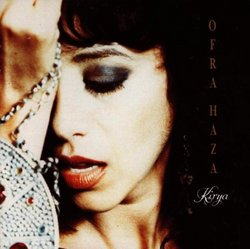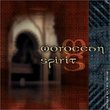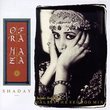| All Artists: Ofra Haza Title: Kirya Members Wishing: 1 Total Copies: 0 Label: Atlantic UK Release Date: 1/13/2008 Album Type: Import Genres: Dance & Electronic, Folk, International Music, Pop Styles: World Dance, Jewish & Yiddish, Middle East, Israel, Dance Pop Number of Discs: 1 SwapaCD Credits: 1 UPC: 090317612720 |
Search - Ofra Haza :: Kirya
 | Ofra Haza Kirya Genres: Dance & Electronic, Folk, International Music, Pop After having essentially kick-started the idea of ethno-techno with Fifty Gates of Wisdom, Israeli diva Ofra Haza stalled creatively at the start of the 1990s. In 1992, however, she pushed herself ahead with the album Kiry... more » |
Larger Image |
CD DetailsSynopsis
Amazon.com After having essentially kick-started the idea of ethno-techno with Fifty Gates of Wisdom, Israeli diva Ofra Haza stalled creatively at the start of the 1990s. In 1992, however, she pushed herself ahead with the album Kirya while still keeping intact her Yemenite Jewish roots. The production was high-tech but underneath the machinery lay plenty of thought for the music. She added hip-hop as well as other musical genres to her sound. This hybrid style became a kind of forerunner to the work of Natacha Atlas and Transglobal Underground. Bringing Lou Reed into the picture for a duet on "Daw Da Hiya" was something of a masterstroke, even if it didn't pay dividends in terms of sales. In essence, this adventurous disc is a landmark in world fusion music with the title track and "Trains of No Return" clear standouts. Once again, Haza pushed the envelope. --Chris Nickson Similar CDs
|
CD ReviewsThe Best Middle Eastern work of Ofra Haza MusicMan | 03/04/2004 (5 out of 5 stars) "This is a wonderful work, because this great israeli singer sing in three languages of that zone of the world (hebrew, arabic and aramaic) with fabulous ryhtms of the jew and arab cultures. Any songs are half english, half semitic language. I prefer the sounds ethnic, and the song Daw Da Hiya (english and judeo arabic), with the narration of Iggy Pop, is really stirring. This song reflects the sad life of many women in those countries. Also I like Mystery, Fate and Love, because is a magnetic song in english, like Barefoot, with that sensual rythm with lyrics in hebrew (she repeat constantly the arabic word "albi", "my heart"). And obvius, Trains of No Return, with a message of peace and alive, in memory of the jews died in the Holocaust.Ofra Haza was a goddes of the world music. Only I had wanted that she sang more songs in spanish, because she had a magnificent voice.Shalom Ofra." Small Corrections PhoenixTree | Seattle | 08/17/2005 (4 out of 5 stars) "First of all; I believe that Ofra Haza had one of the most beautiful voices of our time; and it just goes to show you what the voice of liberty sounds like unrestrained free of the theocratic government of Yemen, (the land of her ancestors.) Just to correct Daniel (the previous reviewer,) like many of Ofra's later albums, some of these songs are sung in English, Hebrew and Arabic, like Innocent. Ofra sings Daw Da Hiya in Arabic, and her lyrics are actually based on a Yemeni folk song that is known throughout Yemen to Arabs and Jews alike, and really have nothing to do with the subject of imprisonment of love, and Iggy Pop accompanies her in English. In her latter albums Ofra tended to give props to her Yemenite roots by including Arabic lyrics to her songs, like Inta, I Want To Fly, D'ale D'ale, Taw Shi, (from Desert Wind and Shaday, -'Inta' actually means 'you' in Arabic). She also endeavored to sing songs in Arabic completely in Fifty Gates of Wisdom, the three songs sung exclusively in Arabic are 'Galbi,' 'A'salk,' and 'Yachilva Yachali.' She was never ashamed of her Arab (Yemenite) Jewish heritage and became the siren voice of Yemenite women everywhere, and some cases Yemenite men, (like moi)." Stirring and hauntingly beautiful D. Pawl | Seattle | 10/06/2005 (5 out of 5 stars) "Those of you who aren't familiar with Ofra Haza, I encourage you to please listen to this beautiful woman's albums. "Kirya" is definitely a wonderful example of the legacy Haza left, when she passed away in 2000. Although some call her the "Madonna of the Middle East," in my opinion I think she is far more talented, prolific and outstanding. For starters, Ofra Haza was devoutly religious, as a Yemenite Jew, from Israel, had a clean sound, put ancient poetry to music, and used her voice as an instrument for peace and liberation. That is where she and Madonna vear off quite differently from one another.
"Kirya" presents a beautiful cross-section of songs and experiences. We hear her sing in English, Arameic and Hebrew. The songs are about sadness, mortality and love. Some great, outstanding examples on this album include: "Trains of No Return" (about the effects of the Holocaust and the trains heading to Auschwitz and Dachau, amongst many other concentration camps, where Jews were systematically executed), "Daw da Hiya," (about the consequences of a young woman's premarital affair with her lover), and "Don't Forsake Me" (about old age). This is a treasure of an album. Buy it today.....Let the legacy of Ofra Haza remain for many, many years to come. What an inspirational and beautiful woman......." |




